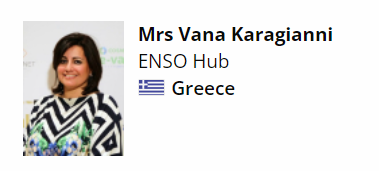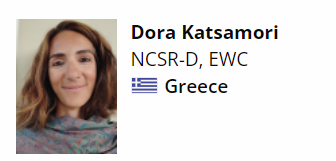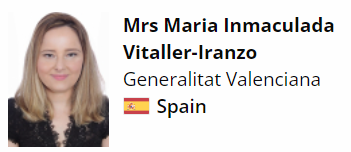Taking stock of the latest activities carried out within Cedefop VET4Youth team and the Ambassadors for tackling early leaving from VET, we are sharing a summary of the latest highlights, wishing everyone a restful summer break with this good read!
NEWS FROM CEDEFOP VET4YOUTH TEAM
Cedefop podcast – Episode 17: Training teachers for a green and digital future
Is teachers' and trainers’ professional development commensurate with their key role in the educational process? What are the factors that slow it down? How can we make sure that training keeps up with the fast-paced digital and green transitions and the new curricula demands? In the context of the European Year of Skills, Cedefop expert Rena Psifidou, who leads a project dedicated to teachers and trainers, and Rubén Vázquez, a teacher from Spain’s Galicia region who works on addressing these challenges, share their views on the current situation and on what needs to change. Listen to the podcast!

Challenges and opportunities for low-skilled adults in changing labour markets – Blog article by Cedefop experts Irene Psifidou and Ilias Livanos
Low levels of skills are associated with negative economic and social consequences not just for the individuals and their families but also for the whole economy and society. The other side of the coin is that investing in education is linked to higher economic and social returns. Thus, empowering low-skilled adults by means of promoting their upskilling and re-skilling must be seen as a priority, especially nowadays that employment and the economy overall is becoming skills intensive.
Read the full blog article!

Multidisciplinary approaches: a comprehensive intervention to empower those at risk – Blog article by Ambassadors’ coordinator Irene Psifidou and Cedefop VET toolkit administrator Anthie Kyriakopoulou
Reintegration of individuals at risk into education, training or the labour market is one of the main objectives of vocational education and training (VET) and lifelong learning programmes. A holistic approach embedding strengthened cooperation among a wide range of stakeholders is key in achieving this objective.
At EU policy level, and most recently in the Council Recommendation on pathways to school success adopted in 2022, there is an increasing recognition of the importance of combining services for marginalised groups in a community-based location as one-stop-shop multidisciplinary teams. These so-called community lifelong learning centres (CLLC) engage actively a wide range of professionals, such as social and health services, youth services, outreach care workers, psychologists, special emotional counsellors/therapists, nurses, speech and language therapists, guidance specialists, youth workers, local authorities, NGOs, businesses, unions, volunteers, etc.
Read the full blog article!

What does it mean to be a vocational education and training teacher in today's world? – Article by Ambassadors coordinator Dr Irene Psifidou
Dr Irene Psifidou shares her reflections on being a VET teacher in today’s world in an article published on the European School Education Platform – The teaching profession shapes all other professions. Without teachers, we may not have doctors, engineers, or hairdressers. But most importantly, the role of teachers is to move our brains, hearts, and even stomachs – fundamental organs for thinking, transforming, enjoying, and suffering – to improve everyone's lives.
Read the full article!

New Cedefop call for tenders is out! European VET Teachers Survey (EVTS): Supporting teachers’ professional development in VET schools - CEDEFOP/2023/OP/0005
The aim of this framework contract is to deliver a dataset that will enhance understanding by Cedefop and the wider research/policy community of the opportunities, experiences, challenges and contextual factors affecting the continuing professional development (CPD) of teachers in initial VET schools in EU Member States.
This call has been published in the Supplement to the Official Journal of the European Union 2023/S 115-356741 of 16/06/2023.
The procurement documents are available via the TED e-Tendering platform: https://etendering.ted.europa.eu/cft/cft-display.html?cftId=14679.
Requests for additional information/clarification should be received by 28/08/2023, 23h59 (UTC+03:00 Greek local time). All questions and answers will be available in the above-mentioned website.
Tenders will be opened in a virtual opening session on the date and time indicated under Section IV.2.7 of the contract notice and point 3.2 of the invitation to tender.
Read about the call for tenders!
NEWS FROM THE AMBASSADORS
Take the opportunity to contribute to the Special Issue on Dropout in VET in the journal 'Empirical Research in Vocational Education and Training' - The editors welcome research contributions (empirical and conceptual or measurement-related articles) on dropouts (e.g., premature terminations, intentions to terminate, early leaving) that are situated in vocational and professional education at workplaces, schools, or other tertiary professional education institutions. Interested authors can submit a short abstract by July 31st to get feedback on their paper idea. Full paper submission is due on December 31st. The call can be found here: https://ervet-journal.springeropen.com/call-for-papers--dropouts-in-vocational-and-professional-educati
Take the time to read two papers by our Ambassador from Germany Prof Viola Deutscher are now available on our toolkit:
Drop out in dual VET: why we should consider the drop out direction when analysing drop out – by Maximilian Krötz and Viola Deutscher, University of Mannheim, Germany – Despite high drop-out rates from vocational education and training (VET) throughout most countries and a long research tradition on potential drop-out reasons, little is known about the effects exerted on drop-out intentions by the quality of training. Furthermore, only rarely do scholars distinguish between different drop-out directions, and systematic insights on possibly differing causes are scarce.
Dropout from initial vocational training – A meta-synthesis of reasons from the apprentice’s point of view – by Svenja Böhn and Viola Deutscher, University of Mannheim, Germany – Internationally, vocational education and training (VET) faces some major challenges, one of them certainly constituting the number of premature terminations of contract. A large part of former research within this context has concentrated on the identification and analysis of dropout reasons from the apprentice’s point of view.
Our Ambassador from Portugal Ana Ribeiro participated in a Teaching assignment in Serbia, from 26 to 30 June, where she presented Cedefop VET toolkit for tackling early leaving.
Our Ambassador from the United Kingdom Russell Hogarth has been promoting Cedefop VET toolkit for tackling early leaving via his global network of Creative Communities Group Members. One particular point of interest has been involving citizens as volunteer mentors for VET students. This approach is now being supported by Russell’s colleagues in the UK, in Australia, Canada and Africa. Closer to home in the UK, Russell has been personally using the toolkit with his students at Creativity Works Preston. CWP educates and teaches the excluded students from our local high schools and academies from the age of 14 to 25. CWP have successfully managed to get a number of students back into full time education or onto employment. The CWP have also, in addition to academic teaching, started a course of vocational skills training including, bricklaying, plastering and joinery. This vocational training, focusing mainly on the building trade is helping to teach the disengaged from education employability skills. Russell is using the toolkit and Cedefop in his lifelong learning and active citizenship conference workshops and keynote speeches. He also intends to use the toolkit in his new role as the chairman for 'Lancashire Creative Commonwealth Association'. Russell encourages all of us to keep up the good work and keep in touch!
MEET OUR NEW MEMBERS

Vana is a People Architect with 20+ years of experience in education consultancy services, working with professionals and training and VET organisations from all over Europe. She’s the co-founder of ENSŌ, a European knowledge hub which assists people to bring out the best in themselves, improve both their lives and the ecosystem around them, motivate them to get out of their comfort zone, and finally contribute with added value to society. She uses tools that meet any innovation that is social in its ends or in its means, or simply any working, innovative solution to help address a pressing societal challenge.

Dr Dora Katsamori is a research associate at NCSR ‘Demokritos’ and a post-doctoral researcher at the University of the Peloponnese in the field of citizenship and non-formal education and inclusion. She has a long experience as project coordinator and researcher in European and national funded research projects, as well as educator in the field of civic and political education, mainly working with youth and people coming from socially disadvantaged groups (refugees, immigrants, prisoners, etc.). She is also working as consultant of the European Wergeland Center in the field of refugee education in Greece.
Dora is also the coordinator of the project ‘Schools for All – Integration of Refugee Children in Greek Schools’, which was recently uploaded as a good practice on our toolkit! '31 Basic Activities' handbook: A useful educational tool for refugee reception in classrooms, schools, and communities' was produced within the context of this project.

Maria Inmaculada is a Spanish vocational teacher with extensive experience as a speaker and writer of publications. In addition, she is a judge international student competitions and a member of several US educational associations.
